Analysing Culture, Motivation & Team Dynamics in Ford UK Context
VerifiedAdded on 2023/01/05
|16
|5284
|72
Report
AI Summary
This report provides a comprehensive analysis of organizational behaviour, focusing on the influence of culture, politics, and power on employee behaviour within the context of Ford UK. It examines various theories of motivation, including content theories like Maslow's Hierarchy of Needs and process theories like Vroom's Expectancy Theory, and explores motivational techniques for achieving organizational goals. The report also discusses the characteristics of effective versus ineffective teams and applies these concepts to Ford UK, considering how leadership can leverage power, navigate organizational politics, and foster a positive organizational culture to improve team performance and overall effectiveness. The analysis considers the impact of different organizational cultures, such as power, task, person, and role cultures, on employee behaviour and productivity. Access more solved assignments and resources on Desklib.
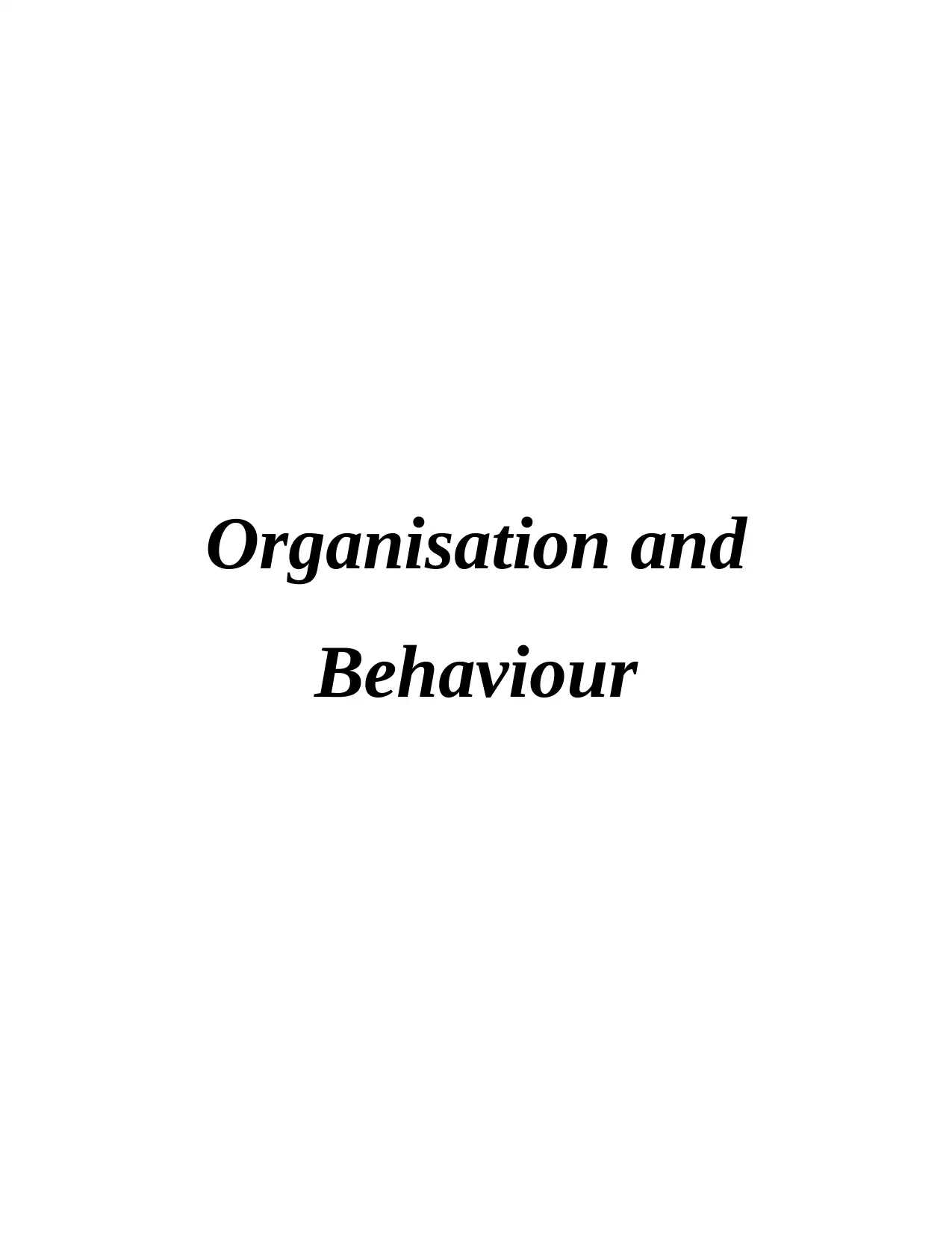
Organisation and
Behaviour
Behaviour
Paraphrase This Document
Need a fresh take? Get an instant paraphrase of this document with our AI Paraphraser
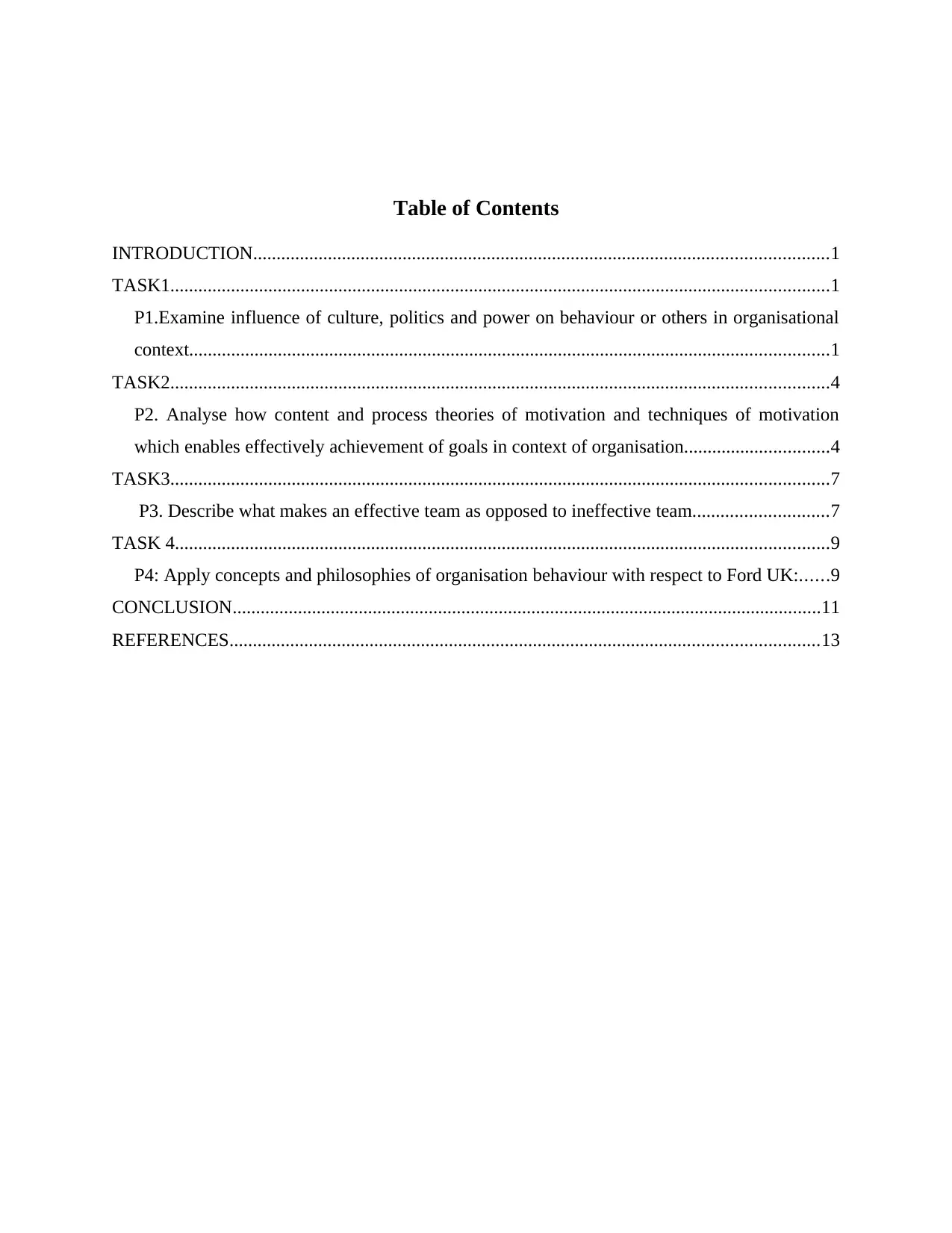
Table of Contents
INTRODUCTION...........................................................................................................................1
TASK1.............................................................................................................................................1
P1.Examine influence of culture, politics and power on behaviour or others in organisational
context.........................................................................................................................................1
TASK2.............................................................................................................................................4
P2. Analyse how content and process theories of motivation and techniques of motivation
which enables effectively achievement of goals in context of organisation...............................4
TASK3.............................................................................................................................................7
P3. Describe what makes an effective team as opposed to ineffective team.............................7
TASK 4............................................................................................................................................9
P4: Apply concepts and philosophies of organisation behaviour with respect to Ford UK:......9
CONCLUSION..............................................................................................................................11
REFERENCES..............................................................................................................................13
INTRODUCTION...........................................................................................................................1
TASK1.............................................................................................................................................1
P1.Examine influence of culture, politics and power on behaviour or others in organisational
context.........................................................................................................................................1
TASK2.............................................................................................................................................4
P2. Analyse how content and process theories of motivation and techniques of motivation
which enables effectively achievement of goals in context of organisation...............................4
TASK3.............................................................................................................................................7
P3. Describe what makes an effective team as opposed to ineffective team.............................7
TASK 4............................................................................................................................................9
P4: Apply concepts and philosophies of organisation behaviour with respect to Ford UK:......9
CONCLUSION..............................................................................................................................11
REFERENCES..............................................................................................................................13
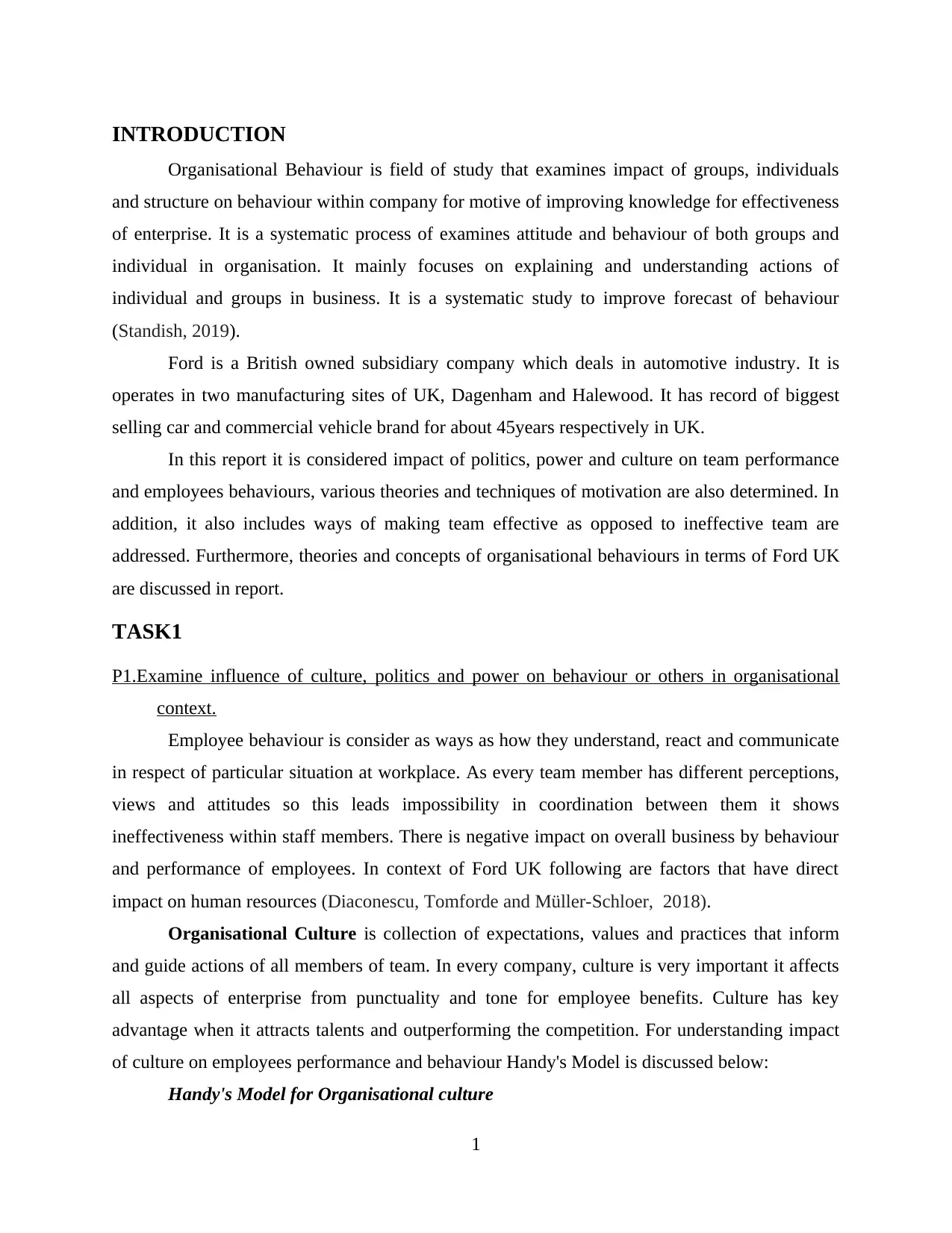
INTRODUCTION
Organisational Behaviour is field of study that examines impact of groups, individuals
and structure on behaviour within company for motive of improving knowledge for effectiveness
of enterprise. It is a systematic process of examines attitude and behaviour of both groups and
individual in organisation. It mainly focuses on explaining and understanding actions of
individual and groups in business. It is a systematic study to improve forecast of behaviour
(Standish, 2019).
Ford is a British owned subsidiary company which deals in automotive industry. It is
operates in two manufacturing sites of UK, Dagenham and Halewood. It has record of biggest
selling car and commercial vehicle brand for about 45years respectively in UK.
In this report it is considered impact of politics, power and culture on team performance
and employees behaviours, various theories and techniques of motivation are also determined. In
addition, it also includes ways of making team effective as opposed to ineffective team are
addressed. Furthermore, theories and concepts of organisational behaviours in terms of Ford UK
are discussed in report.
TASK1
P1.Examine influence of culture, politics and power on behaviour or others in organisational
context.
Employee behaviour is consider as ways as how they understand, react and communicate
in respect of particular situation at workplace. As every team member has different perceptions,
views and attitudes so this leads impossibility in coordination between them it shows
ineffectiveness within staff members. There is negative impact on overall business by behaviour
and performance of employees. In context of Ford UK following are factors that have direct
impact on human resources (Diaconescu, Tomforde and Müller-Schloer, 2018).
Organisational Culture is collection of expectations, values and practices that inform
and guide actions of all members of team. In every company, culture is very important it affects
all aspects of enterprise from punctuality and tone for employee benefits. Culture has key
advantage when it attracts talents and outperforming the competition. For understanding impact
of culture on employees performance and behaviour Handy's Model is discussed below:
Handy's Model for Organisational culture
1
Organisational Behaviour is field of study that examines impact of groups, individuals
and structure on behaviour within company for motive of improving knowledge for effectiveness
of enterprise. It is a systematic process of examines attitude and behaviour of both groups and
individual in organisation. It mainly focuses on explaining and understanding actions of
individual and groups in business. It is a systematic study to improve forecast of behaviour
(Standish, 2019).
Ford is a British owned subsidiary company which deals in automotive industry. It is
operates in two manufacturing sites of UK, Dagenham and Halewood. It has record of biggest
selling car and commercial vehicle brand for about 45years respectively in UK.
In this report it is considered impact of politics, power and culture on team performance
and employees behaviours, various theories and techniques of motivation are also determined. In
addition, it also includes ways of making team effective as opposed to ineffective team are
addressed. Furthermore, theories and concepts of organisational behaviours in terms of Ford UK
are discussed in report.
TASK1
P1.Examine influence of culture, politics and power on behaviour or others in organisational
context.
Employee behaviour is consider as ways as how they understand, react and communicate
in respect of particular situation at workplace. As every team member has different perceptions,
views and attitudes so this leads impossibility in coordination between them it shows
ineffectiveness within staff members. There is negative impact on overall business by behaviour
and performance of employees. In context of Ford UK following are factors that have direct
impact on human resources (Diaconescu, Tomforde and Müller-Schloer, 2018).
Organisational Culture is collection of expectations, values and practices that inform
and guide actions of all members of team. In every company, culture is very important it affects
all aspects of enterprise from punctuality and tone for employee benefits. Culture has key
advantage when it attracts talents and outperforming the competition. For understanding impact
of culture on employees performance and behaviour Handy's Model is discussed below:
Handy's Model for Organisational culture
1
⊘ This is a preview!⊘
Do you want full access?
Subscribe today to unlock all pages.

Trusted by 1+ million students worldwide
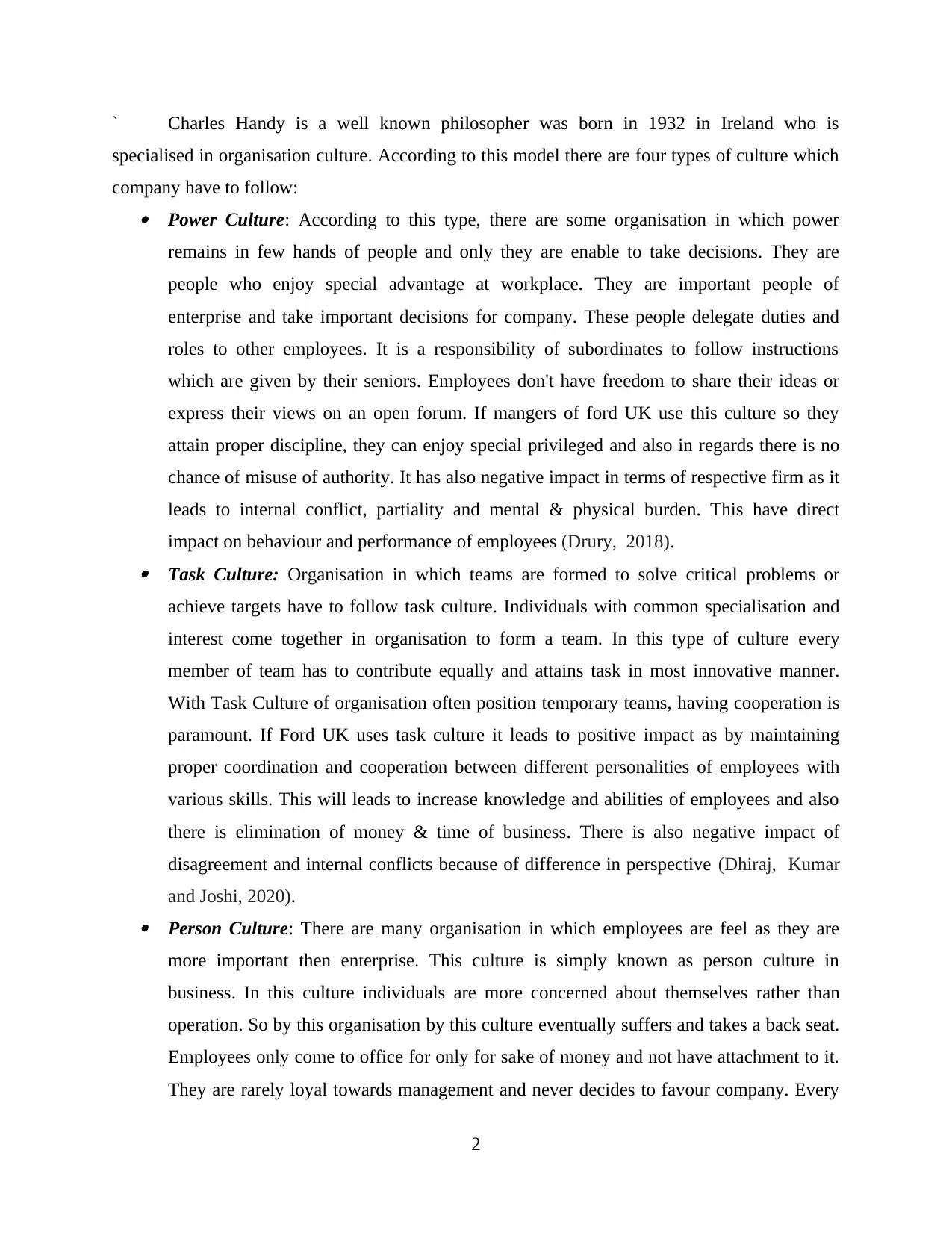
` Charles Handy is a well known philosopher was born in 1932 in Ireland who is
specialised in organisation culture. According to this model there are four types of culture which
company have to follow: Power Culture: According to this type, there are some organisation in which power
remains in few hands of people and only they are enable to take decisions. They are
people who enjoy special advantage at workplace. They are important people of
enterprise and take important decisions for company. These people delegate duties and
roles to other employees. It is a responsibility of subordinates to follow instructions
which are given by their seniors. Employees don't have freedom to share their ideas or
express their views on an open forum. If mangers of ford UK use this culture so they
attain proper discipline, they can enjoy special privileged and also in regards there is no
chance of misuse of authority. It has also negative impact in terms of respective firm as it
leads to internal conflict, partiality and mental & physical burden. This have direct
impact on behaviour and performance of employees (Drury, 2018). Task Culture: Organisation in which teams are formed to solve critical problems or
achieve targets have to follow task culture. Individuals with common specialisation and
interest come together in organisation to form a team. In this type of culture every
member of team has to contribute equally and attains task in most innovative manner.
With Task Culture of organisation often position temporary teams, having cooperation is
paramount. If Ford UK uses task culture it leads to positive impact as by maintaining
proper coordination and cooperation between different personalities of employees with
various skills. This will leads to increase knowledge and abilities of employees and also
there is elimination of money & time of business. There is also negative impact of
disagreement and internal conflicts because of difference in perspective (Dhiraj, Kumar
and Joshi, 2020). Person Culture: There are many organisation in which employees are feel as they are
more important then enterprise. This culture is simply known as person culture in
business. In this culture individuals are more concerned about themselves rather than
operation. So by this organisation by this culture eventually suffers and takes a back seat.
Employees only come to office for only for sake of money and not have attachment to it.
They are rarely loyal towards management and never decides to favour company. Every
2
specialised in organisation culture. According to this model there are four types of culture which
company have to follow: Power Culture: According to this type, there are some organisation in which power
remains in few hands of people and only they are enable to take decisions. They are
people who enjoy special advantage at workplace. They are important people of
enterprise and take important decisions for company. These people delegate duties and
roles to other employees. It is a responsibility of subordinates to follow instructions
which are given by their seniors. Employees don't have freedom to share their ideas or
express their views on an open forum. If mangers of ford UK use this culture so they
attain proper discipline, they can enjoy special privileged and also in regards there is no
chance of misuse of authority. It has also negative impact in terms of respective firm as it
leads to internal conflict, partiality and mental & physical burden. This have direct
impact on behaviour and performance of employees (Drury, 2018). Task Culture: Organisation in which teams are formed to solve critical problems or
achieve targets have to follow task culture. Individuals with common specialisation and
interest come together in organisation to form a team. In this type of culture every
member of team has to contribute equally and attains task in most innovative manner.
With Task Culture of organisation often position temporary teams, having cooperation is
paramount. If Ford UK uses task culture it leads to positive impact as by maintaining
proper coordination and cooperation between different personalities of employees with
various skills. This will leads to increase knowledge and abilities of employees and also
there is elimination of money & time of business. There is also negative impact of
disagreement and internal conflicts because of difference in perspective (Dhiraj, Kumar
and Joshi, 2020). Person Culture: There are many organisation in which employees are feel as they are
more important then enterprise. This culture is simply known as person culture in
business. In this culture individuals are more concerned about themselves rather than
operation. So by this organisation by this culture eventually suffers and takes a back seat.
Employees only come to office for only for sake of money and not have attachment to it.
They are rarely loyal towards management and never decides to favour company. Every
2
Paraphrase This Document
Need a fresh take? Get an instant paraphrase of this document with our AI Paraphraser
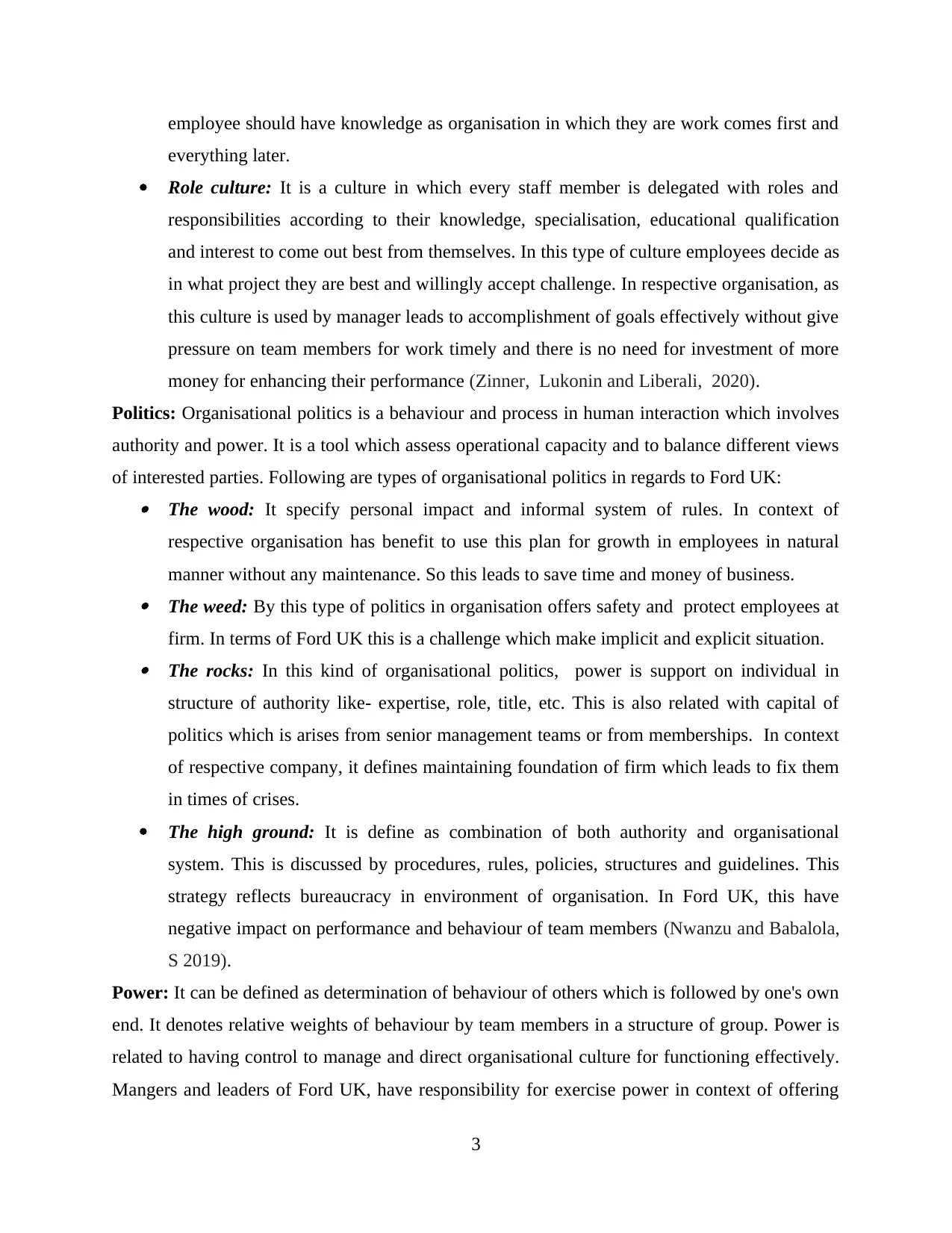
employee should have knowledge as organisation in which they are work comes first and
everything later.
Role culture: It is a culture in which every staff member is delegated with roles and
responsibilities according to their knowledge, specialisation, educational qualification
and interest to come out best from themselves. In this type of culture employees decide as
in what project they are best and willingly accept challenge. In respective organisation, as
this culture is used by manager leads to accomplishment of goals effectively without give
pressure on team members for work timely and there is no need for investment of more
money for enhancing their performance (Zinner, Lukonin and Liberali, 2020).
Politics: Organisational politics is a behaviour and process in human interaction which involves
authority and power. It is a tool which assess operational capacity and to balance different views
of interested parties. Following are types of organisational politics in regards to Ford UK: The wood: It specify personal impact and informal system of rules. In context of
respective organisation has benefit to use this plan for growth in employees in natural
manner without any maintenance. So this leads to save time and money of business. The weed: By this type of politics in organisation offers safety and protect employees at
firm. In terms of Ford UK this is a challenge which make implicit and explicit situation. The rocks: In this kind of organisational politics, power is support on individual in
structure of authority like- expertise, role, title, etc. This is also related with capital of
politics which is arises from senior management teams or from memberships. In context
of respective company, it defines maintaining foundation of firm which leads to fix them
in times of crises.
The high ground: It is define as combination of both authority and organisational
system. This is discussed by procedures, rules, policies, structures and guidelines. This
strategy reflects bureaucracy in environment of organisation. In Ford UK, this have
negative impact on performance and behaviour of team members (Nwanzu and Babalola,
S 2019).
Power: It can be defined as determination of behaviour of others which is followed by one's own
end. It denotes relative weights of behaviour by team members in a structure of group. Power is
related to having control to manage and direct organisational culture for functioning effectively.
Mangers and leaders of Ford UK, have responsibility for exercise power in context of offering
3
everything later.
Role culture: It is a culture in which every staff member is delegated with roles and
responsibilities according to their knowledge, specialisation, educational qualification
and interest to come out best from themselves. In this type of culture employees decide as
in what project they are best and willingly accept challenge. In respective organisation, as
this culture is used by manager leads to accomplishment of goals effectively without give
pressure on team members for work timely and there is no need for investment of more
money for enhancing their performance (Zinner, Lukonin and Liberali, 2020).
Politics: Organisational politics is a behaviour and process in human interaction which involves
authority and power. It is a tool which assess operational capacity and to balance different views
of interested parties. Following are types of organisational politics in regards to Ford UK: The wood: It specify personal impact and informal system of rules. In context of
respective organisation has benefit to use this plan for growth in employees in natural
manner without any maintenance. So this leads to save time and money of business. The weed: By this type of politics in organisation offers safety and protect employees at
firm. In terms of Ford UK this is a challenge which make implicit and explicit situation. The rocks: In this kind of organisational politics, power is support on individual in
structure of authority like- expertise, role, title, etc. This is also related with capital of
politics which is arises from senior management teams or from memberships. In context
of respective company, it defines maintaining foundation of firm which leads to fix them
in times of crises.
The high ground: It is define as combination of both authority and organisational
system. This is discussed by procedures, rules, policies, structures and guidelines. This
strategy reflects bureaucracy in environment of organisation. In Ford UK, this have
negative impact on performance and behaviour of team members (Nwanzu and Babalola,
S 2019).
Power: It can be defined as determination of behaviour of others which is followed by one's own
end. It denotes relative weights of behaviour by team members in a structure of group. Power is
related to having control to manage and direct organisational culture for functioning effectively.
Mangers and leaders of Ford UK, have responsibility for exercise power in context of offering
3
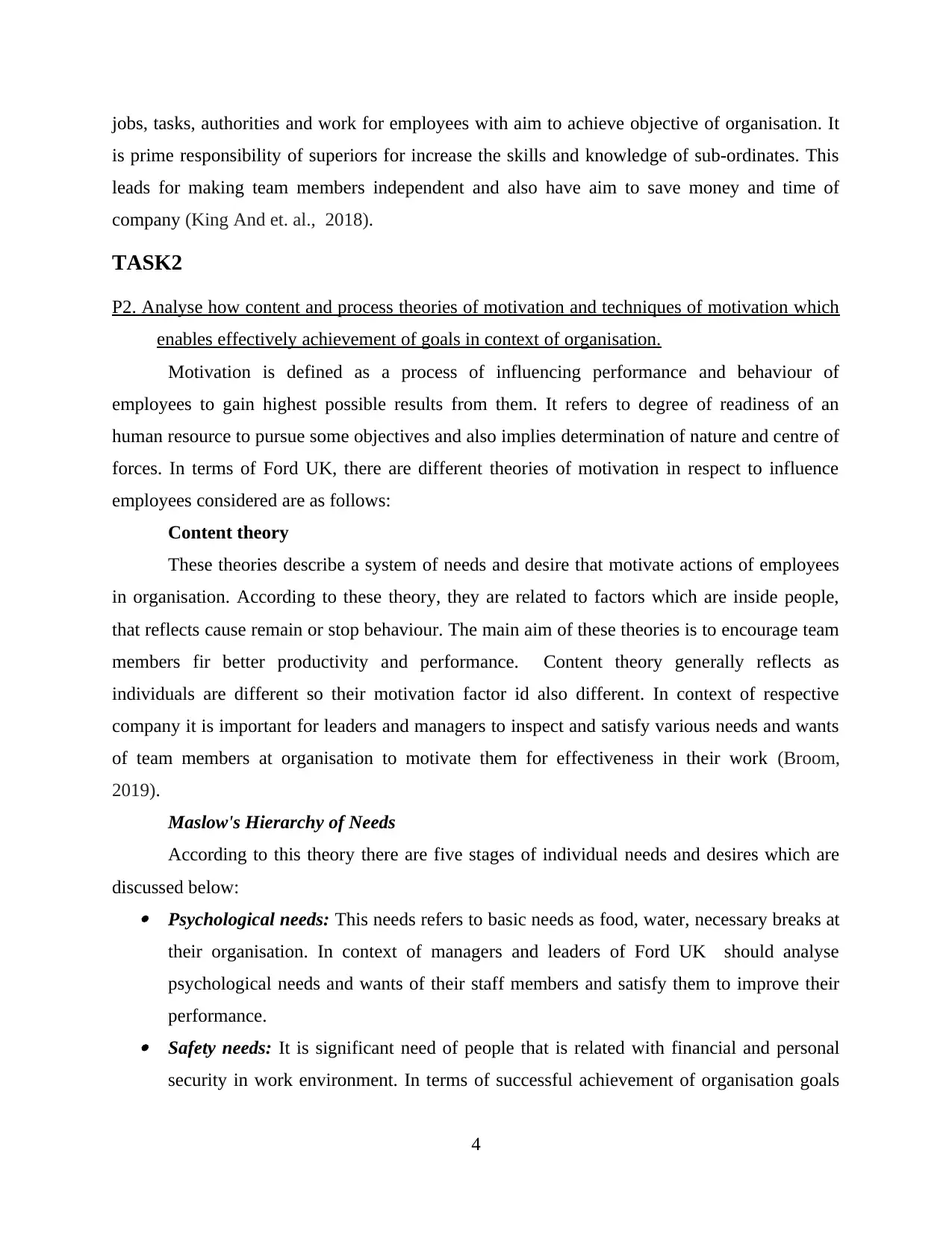
jobs, tasks, authorities and work for employees with aim to achieve objective of organisation. It
is prime responsibility of superiors for increase the skills and knowledge of sub-ordinates. This
leads for making team members independent and also have aim to save money and time of
company (King And et. al., 2018).
TASK2
P2. Analyse how content and process theories of motivation and techniques of motivation which
enables effectively achievement of goals in context of organisation.
Motivation is defined as a process of influencing performance and behaviour of
employees to gain highest possible results from them. It refers to degree of readiness of an
human resource to pursue some objectives and also implies determination of nature and centre of
forces. In terms of Ford UK, there are different theories of motivation in respect to influence
employees considered are as follows:
Content theory
These theories describe a system of needs and desire that motivate actions of employees
in organisation. According to these theory, they are related to factors which are inside people,
that reflects cause remain or stop behaviour. The main aim of these theories is to encourage team
members fir better productivity and performance. Content theory generally reflects as
individuals are different so their motivation factor id also different. In context of respective
company it is important for leaders and managers to inspect and satisfy various needs and wants
of team members at organisation to motivate them for effectiveness in their work (Broom,
2019).
Maslow's Hierarchy of Needs
According to this theory there are five stages of individual needs and desires which are
discussed below: Psychological needs: This needs refers to basic needs as food, water, necessary breaks at
their organisation. In context of managers and leaders of Ford UK should analyse
psychological needs and wants of their staff members and satisfy them to improve their
performance. Safety needs: It is significant need of people that is related with financial and personal
security in work environment. In terms of successful achievement of organisation goals
4
is prime responsibility of superiors for increase the skills and knowledge of sub-ordinates. This
leads for making team members independent and also have aim to save money and time of
company (King And et. al., 2018).
TASK2
P2. Analyse how content and process theories of motivation and techniques of motivation which
enables effectively achievement of goals in context of organisation.
Motivation is defined as a process of influencing performance and behaviour of
employees to gain highest possible results from them. It refers to degree of readiness of an
human resource to pursue some objectives and also implies determination of nature and centre of
forces. In terms of Ford UK, there are different theories of motivation in respect to influence
employees considered are as follows:
Content theory
These theories describe a system of needs and desire that motivate actions of employees
in organisation. According to these theory, they are related to factors which are inside people,
that reflects cause remain or stop behaviour. The main aim of these theories is to encourage team
members fir better productivity and performance. Content theory generally reflects as
individuals are different so their motivation factor id also different. In context of respective
company it is important for leaders and managers to inspect and satisfy various needs and wants
of team members at organisation to motivate them for effectiveness in their work (Broom,
2019).
Maslow's Hierarchy of Needs
According to this theory there are five stages of individual needs and desires which are
discussed below: Psychological needs: This needs refers to basic needs as food, water, necessary breaks at
their organisation. In context of managers and leaders of Ford UK should analyse
psychological needs and wants of their staff members and satisfy them to improve their
performance. Safety needs: It is significant need of people that is related with financial and personal
security in work environment. In terms of successful achievement of organisation goals
4
⊘ This is a preview!⊘
Do you want full access?
Subscribe today to unlock all pages.

Trusted by 1+ million students worldwide
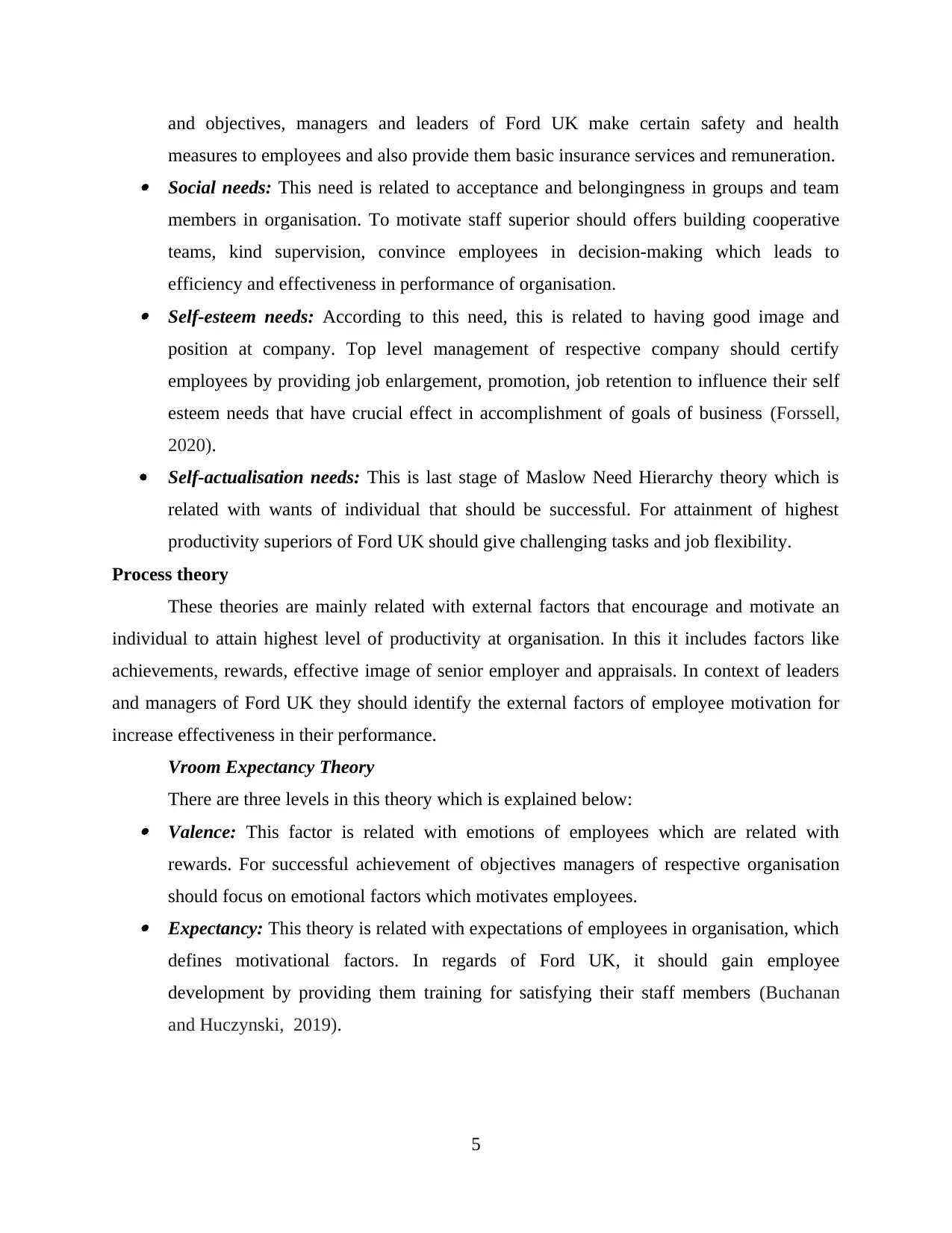
and objectives, managers and leaders of Ford UK make certain safety and health
measures to employees and also provide them basic insurance services and remuneration. Social needs: This need is related to acceptance and belongingness in groups and team
members in organisation. To motivate staff superior should offers building cooperative
teams, kind supervision, convince employees in decision-making which leads to
efficiency and effectiveness in performance of organisation. Self-esteem needs: According to this need, this is related to having good image and
position at company. Top level management of respective company should certify
employees by providing job enlargement, promotion, job retention to influence their self
esteem needs that have crucial effect in accomplishment of goals of business (Forssell,
2020).
Self-actualisation needs: This is last stage of Maslow Need Hierarchy theory which is
related with wants of individual that should be successful. For attainment of highest
productivity superiors of Ford UK should give challenging tasks and job flexibility.
Process theory
These theories are mainly related with external factors that encourage and motivate an
individual to attain highest level of productivity at organisation. In this it includes factors like
achievements, rewards, effective image of senior employer and appraisals. In context of leaders
and managers of Ford UK they should identify the external factors of employee motivation for
increase effectiveness in their performance.
Vroom Expectancy Theory
There are three levels in this theory which is explained below: Valence: This factor is related with emotions of employees which are related with
rewards. For successful achievement of objectives managers of respective organisation
should focus on emotional factors which motivates employees. Expectancy: This theory is related with expectations of employees in organisation, which
defines motivational factors. In regards of Ford UK, it should gain employee
development by providing them training for satisfying their staff members (Buchanan
and Huczynski, 2019).
5
measures to employees and also provide them basic insurance services and remuneration. Social needs: This need is related to acceptance and belongingness in groups and team
members in organisation. To motivate staff superior should offers building cooperative
teams, kind supervision, convince employees in decision-making which leads to
efficiency and effectiveness in performance of organisation. Self-esteem needs: According to this need, this is related to having good image and
position at company. Top level management of respective company should certify
employees by providing job enlargement, promotion, job retention to influence their self
esteem needs that have crucial effect in accomplishment of goals of business (Forssell,
2020).
Self-actualisation needs: This is last stage of Maslow Need Hierarchy theory which is
related with wants of individual that should be successful. For attainment of highest
productivity superiors of Ford UK should give challenging tasks and job flexibility.
Process theory
These theories are mainly related with external factors that encourage and motivate an
individual to attain highest level of productivity at organisation. In this it includes factors like
achievements, rewards, effective image of senior employer and appraisals. In context of leaders
and managers of Ford UK they should identify the external factors of employee motivation for
increase effectiveness in their performance.
Vroom Expectancy Theory
There are three levels in this theory which is explained below: Valence: This factor is related with emotions of employees which are related with
rewards. For successful achievement of objectives managers of respective organisation
should focus on emotional factors which motivates employees. Expectancy: This theory is related with expectations of employees in organisation, which
defines motivational factors. In regards of Ford UK, it should gain employee
development by providing them training for satisfying their staff members (Buchanan
and Huczynski, 2019).
5
Paraphrase This Document
Need a fresh take? Get an instant paraphrase of this document with our AI Paraphraser
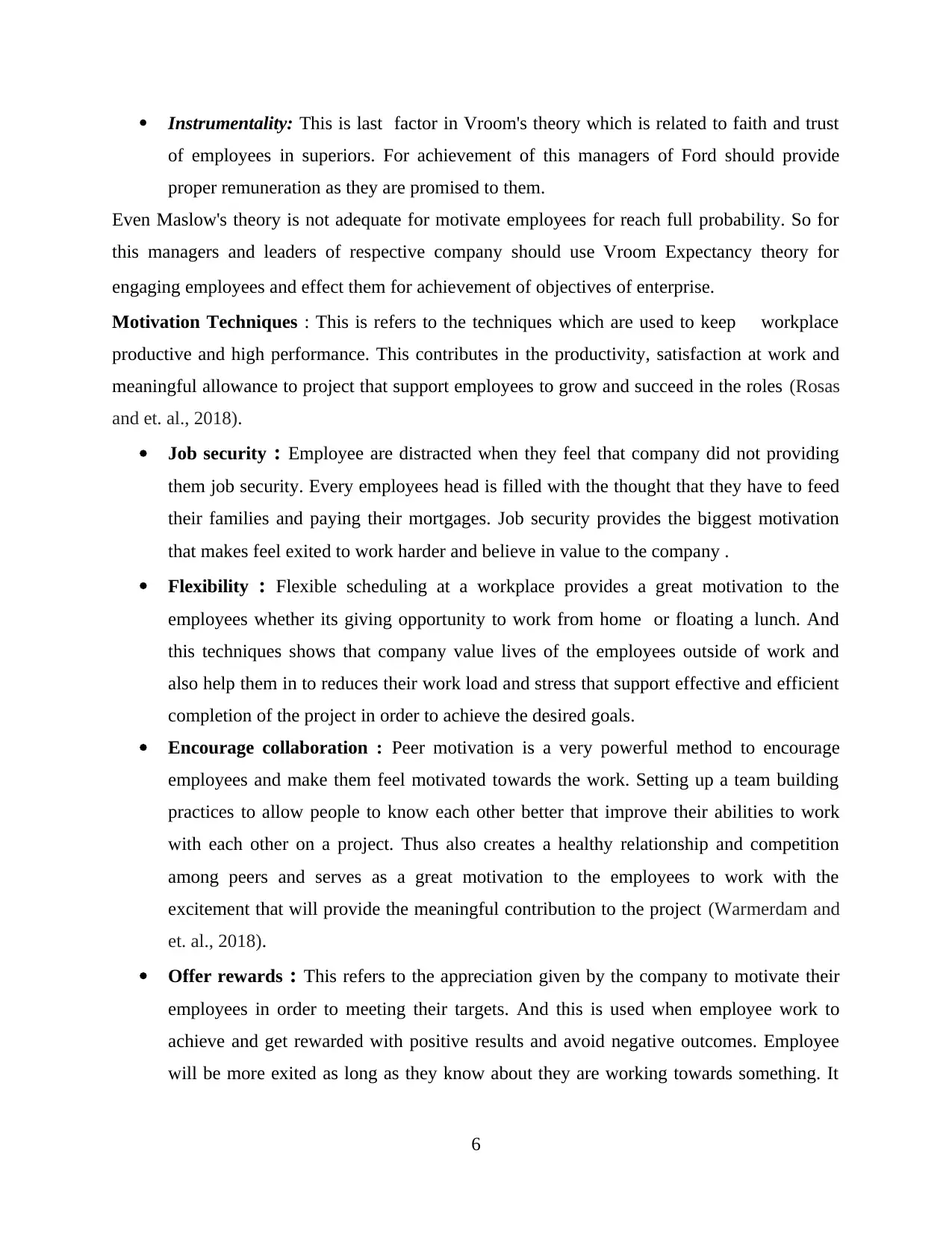
Instrumentality: This is last factor in Vroom's theory which is related to faith and trust
of employees in superiors. For achievement of this managers of Ford should provide
proper remuneration as they are promised to them.
Even Maslow's theory is not adequate for motivate employees for reach full probability. So for
this managers and leaders of respective company should use Vroom Expectancy theory for
engaging employees and effect them for achievement of objectives of enterprise.
Motivation Techniques : This is refers to the techniques which are used to keep workplace
productive and high performance. This contributes in the productivity, satisfaction at work and
meaningful allowance to project that support employees to grow and succeed in the roles (Rosas
and et. al., 2018).
Job security : Employee are distracted when they feel that company did not providing
them job security. Every employees head is filled with the thought that they have to feed
their families and paying their mortgages. Job security provides the biggest motivation
that makes feel exited to work harder and believe in value to the company .
Flexibility : Flexible scheduling at a workplace provides a great motivation to the
employees whether its giving opportunity to work from home or floating a lunch. And
this techniques shows that company value lives of the employees outside of work and
also help them in to reduces their work load and stress that support effective and efficient
completion of the project in order to achieve the desired goals.
Encourage collaboration : Peer motivation is a very powerful method to encourage
employees and make them feel motivated towards the work. Setting up a team building
practices to allow people to know each other better that improve their abilities to work
with each other on a project. Thus also creates a healthy relationship and competition
among peers and serves as a great motivation to the employees to work with the
excitement that will provide the meaningful contribution to the project (Warmerdam and
et. al., 2018).
Offer rewards : This refers to the appreciation given by the company to motivate their
employees in order to meeting their targets. And this is used when employee work to
achieve and get rewarded with positive results and avoid negative outcomes. Employee
will be more exited as long as they know about they are working towards something. It
6
of employees in superiors. For achievement of this managers of Ford should provide
proper remuneration as they are promised to them.
Even Maslow's theory is not adequate for motivate employees for reach full probability. So for
this managers and leaders of respective company should use Vroom Expectancy theory for
engaging employees and effect them for achievement of objectives of enterprise.
Motivation Techniques : This is refers to the techniques which are used to keep workplace
productive and high performance. This contributes in the productivity, satisfaction at work and
meaningful allowance to project that support employees to grow and succeed in the roles (Rosas
and et. al., 2018).
Job security : Employee are distracted when they feel that company did not providing
them job security. Every employees head is filled with the thought that they have to feed
their families and paying their mortgages. Job security provides the biggest motivation
that makes feel exited to work harder and believe in value to the company .
Flexibility : Flexible scheduling at a workplace provides a great motivation to the
employees whether its giving opportunity to work from home or floating a lunch. And
this techniques shows that company value lives of the employees outside of work and
also help them in to reduces their work load and stress that support effective and efficient
completion of the project in order to achieve the desired goals.
Encourage collaboration : Peer motivation is a very powerful method to encourage
employees and make them feel motivated towards the work. Setting up a team building
practices to allow people to know each other better that improve their abilities to work
with each other on a project. Thus also creates a healthy relationship and competition
among peers and serves as a great motivation to the employees to work with the
excitement that will provide the meaningful contribution to the project (Warmerdam and
et. al., 2018).
Offer rewards : This refers to the appreciation given by the company to motivate their
employees in order to meeting their targets. And this is used when employee work to
achieve and get rewarded with positive results and avoid negative outcomes. Employee
will be more exited as long as they know about they are working towards something. It
6
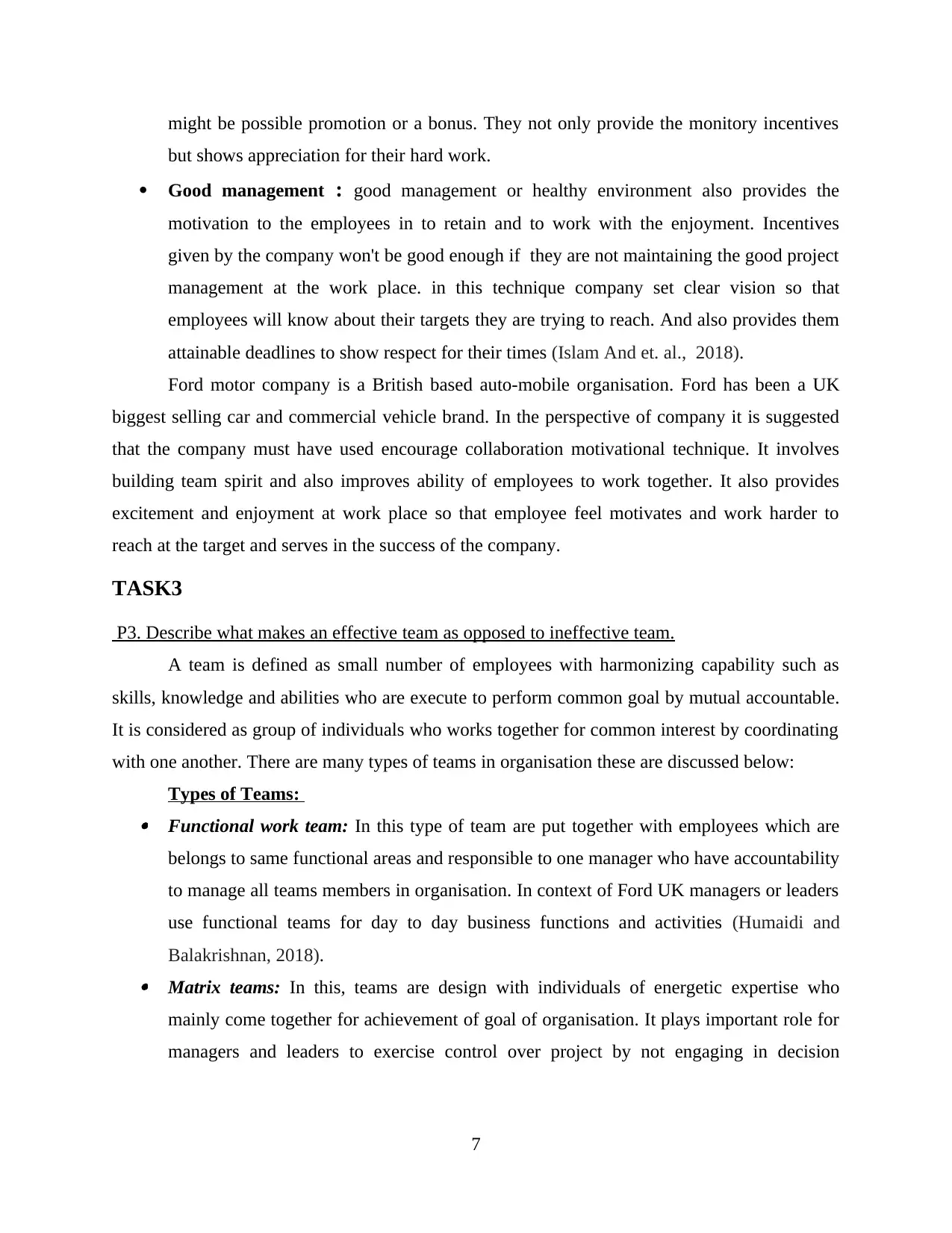
might be possible promotion or a bonus. They not only provide the monitory incentives
but shows appreciation for their hard work.
Good management : good management or healthy environment also provides the
motivation to the employees in to retain and to work with the enjoyment. Incentives
given by the company won't be good enough if they are not maintaining the good project
management at the work place. in this technique company set clear vision so that
employees will know about their targets they are trying to reach. And also provides them
attainable deadlines to show respect for their times (Islam And et. al., 2018).
Ford motor company is a British based auto-mobile organisation. Ford has been a UK
biggest selling car and commercial vehicle brand. In the perspective of company it is suggested
that the company must have used encourage collaboration motivational technique. It involves
building team spirit and also improves ability of employees to work together. It also provides
excitement and enjoyment at work place so that employee feel motivates and work harder to
reach at the target and serves in the success of the company.
TASK3
P3. Describe what makes an effective team as opposed to ineffective team.
A team is defined as small number of employees with harmonizing capability such as
skills, knowledge and abilities who are execute to perform common goal by mutual accountable.
It is considered as group of individuals who works together for common interest by coordinating
with one another. There are many types of teams in organisation these are discussed below:
Types of Teams: Functional work team: In this type of team are put together with employees which are
belongs to same functional areas and responsible to one manager who have accountability
to manage all teams members in organisation. In context of Ford UK managers or leaders
use functional teams for day to day business functions and activities (Humaidi and
Balakrishnan, 2018). Matrix teams: In this, teams are design with individuals of energetic expertise who
mainly come together for achievement of goal of organisation. It plays important role for
managers and leaders to exercise control over project by not engaging in decision
7
but shows appreciation for their hard work.
Good management : good management or healthy environment also provides the
motivation to the employees in to retain and to work with the enjoyment. Incentives
given by the company won't be good enough if they are not maintaining the good project
management at the work place. in this technique company set clear vision so that
employees will know about their targets they are trying to reach. And also provides them
attainable deadlines to show respect for their times (Islam And et. al., 2018).
Ford motor company is a British based auto-mobile organisation. Ford has been a UK
biggest selling car and commercial vehicle brand. In the perspective of company it is suggested
that the company must have used encourage collaboration motivational technique. It involves
building team spirit and also improves ability of employees to work together. It also provides
excitement and enjoyment at work place so that employee feel motivates and work harder to
reach at the target and serves in the success of the company.
TASK3
P3. Describe what makes an effective team as opposed to ineffective team.
A team is defined as small number of employees with harmonizing capability such as
skills, knowledge and abilities who are execute to perform common goal by mutual accountable.
It is considered as group of individuals who works together for common interest by coordinating
with one another. There are many types of teams in organisation these are discussed below:
Types of Teams: Functional work team: In this type of team are put together with employees which are
belongs to same functional areas and responsible to one manager who have accountability
to manage all teams members in organisation. In context of Ford UK managers or leaders
use functional teams for day to day business functions and activities (Humaidi and
Balakrishnan, 2018). Matrix teams: In this, teams are design with individuals of energetic expertise who
mainly come together for achievement of goal of organisation. It plays important role for
managers and leaders to exercise control over project by not engaging in decision
7
⊘ This is a preview!⊘
Do you want full access?
Subscribe today to unlock all pages.

Trusted by 1+ million students worldwide
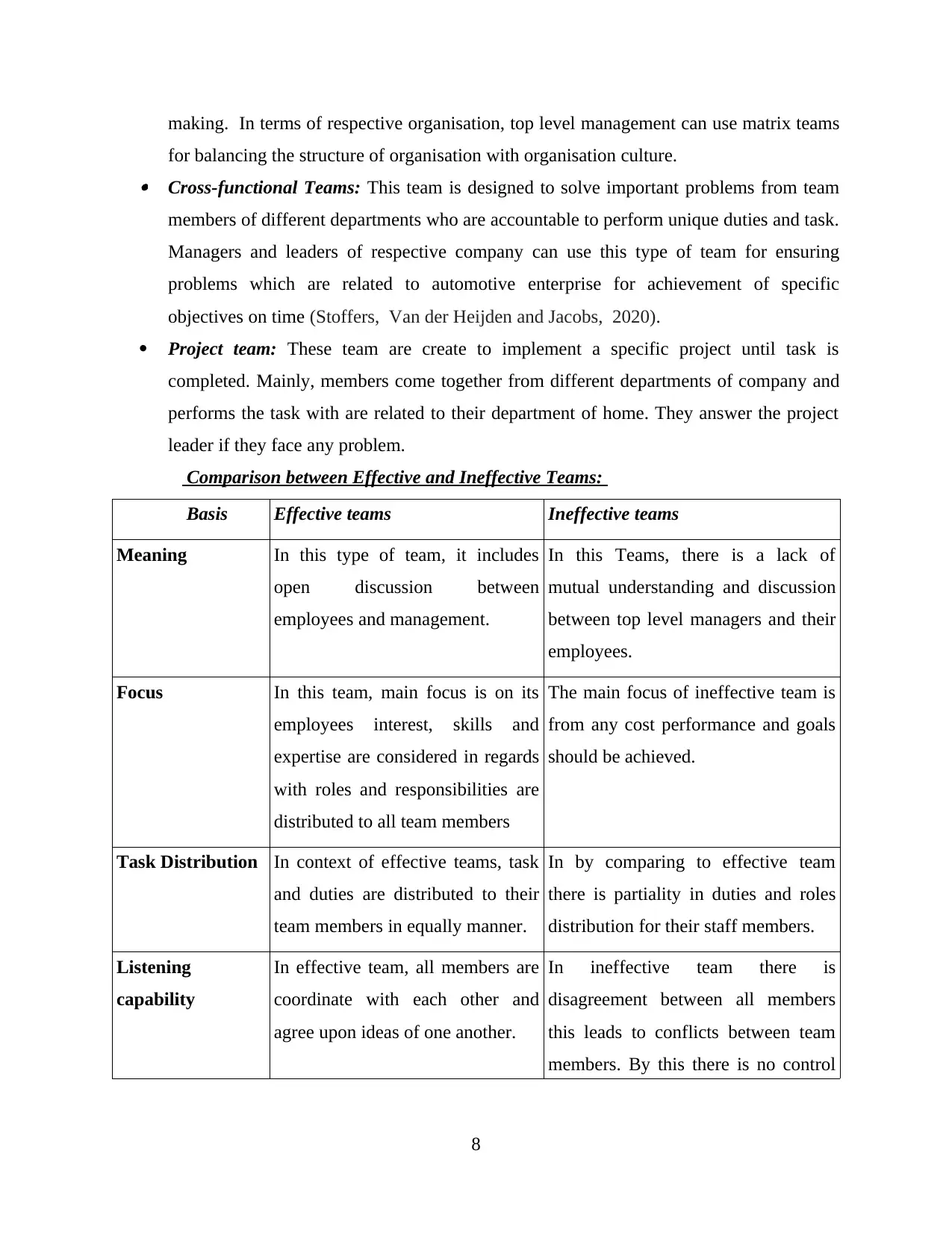
making. In terms of respective organisation, top level management can use matrix teams
for balancing the structure of organisation with organisation culture. Cross-functional Teams: This team is designed to solve important problems from team
members of different departments who are accountable to perform unique duties and task.
Managers and leaders of respective company can use this type of team for ensuring
problems which are related to automotive enterprise for achievement of specific
objectives on time (Stoffers, Van der Heijden and Jacobs, 2020).
Project team: These team are create to implement a specific project until task is
completed. Mainly, members come together from different departments of company and
performs the task with are related to their department of home. They answer the project
leader if they face any problem.
Comparison between Effective and Ineffective Teams:
Basis Effective teams Ineffective teams
Meaning In this type of team, it includes
open discussion between
employees and management.
In this Teams, there is a lack of
mutual understanding and discussion
between top level managers and their
employees.
Focus In this team, main focus is on its
employees interest, skills and
expertise are considered in regards
with roles and responsibilities are
distributed to all team members
The main focus of ineffective team is
from any cost performance and goals
should be achieved.
Task Distribution In context of effective teams, task
and duties are distributed to their
team members in equally manner.
In by comparing to effective team
there is partiality in duties and roles
distribution for their staff members.
Listening
capability
In effective team, all members are
coordinate with each other and
agree upon ideas of one another.
In ineffective team there is
disagreement between all members
this leads to conflicts between team
members. By this there is no control
8
for balancing the structure of organisation with organisation culture. Cross-functional Teams: This team is designed to solve important problems from team
members of different departments who are accountable to perform unique duties and task.
Managers and leaders of respective company can use this type of team for ensuring
problems which are related to automotive enterprise for achievement of specific
objectives on time (Stoffers, Van der Heijden and Jacobs, 2020).
Project team: These team are create to implement a specific project until task is
completed. Mainly, members come together from different departments of company and
performs the task with are related to their department of home. They answer the project
leader if they face any problem.
Comparison between Effective and Ineffective Teams:
Basis Effective teams Ineffective teams
Meaning In this type of team, it includes
open discussion between
employees and management.
In this Teams, there is a lack of
mutual understanding and discussion
between top level managers and their
employees.
Focus In this team, main focus is on its
employees interest, skills and
expertise are considered in regards
with roles and responsibilities are
distributed to all team members
The main focus of ineffective team is
from any cost performance and goals
should be achieved.
Task Distribution In context of effective teams, task
and duties are distributed to their
team members in equally manner.
In by comparing to effective team
there is partiality in duties and roles
distribution for their staff members.
Listening
capability
In effective team, all members are
coordinate with each other and
agree upon ideas of one another.
In ineffective team there is
disagreement between all members
this leads to conflicts between team
members. By this there is no control
8
Paraphrase This Document
Need a fresh take? Get an instant paraphrase of this document with our AI Paraphraser
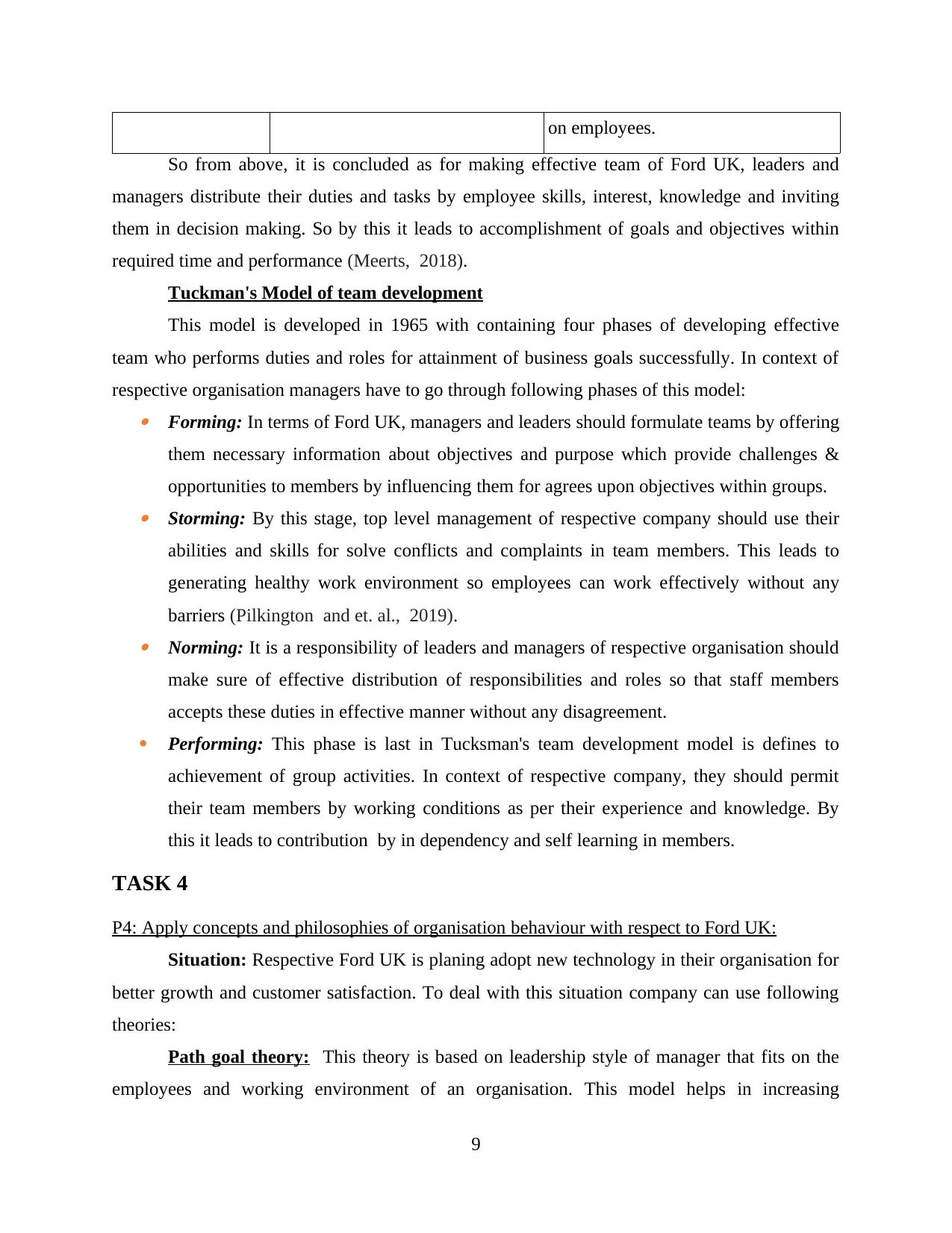
on employees.
So from above, it is concluded as for making effective team of Ford UK, leaders and
managers distribute their duties and tasks by employee skills, interest, knowledge and inviting
them in decision making. So by this it leads to accomplishment of goals and objectives within
required time and performance (Meerts, 2018).
Tuckman's Model of team development
This model is developed in 1965 with containing four phases of developing effective
team who performs duties and roles for attainment of business goals successfully. In context of
respective organisation managers have to go through following phases of this model: Forming: In terms of Ford UK, managers and leaders should formulate teams by offering
them necessary information about objectives and purpose which provide challenges &
opportunities to members by influencing them for agrees upon objectives within groups. Storming: By this stage, top level management of respective company should use their
abilities and skills for solve conflicts and complaints in team members. This leads to
generating healthy work environment so employees can work effectively without any
barriers (Pilkington and et. al., 2019). Norming: It is a responsibility of leaders and managers of respective organisation should
make sure of effective distribution of responsibilities and roles so that staff members
accepts these duties in effective manner without any disagreement.
Performing: This phase is last in Tucksman's team development model is defines to
achievement of group activities. In context of respective company, they should permit
their team members by working conditions as per their experience and knowledge. By
this it leads to contribution by in dependency and self learning in members.
TASK 4
P4: Apply concepts and philosophies of organisation behaviour with respect to Ford UK:
Situation: Respective Ford UK is planing adopt new technology in their organisation for
better growth and customer satisfaction. To deal with this situation company can use following
theories:
Path goal theory: This theory is based on leadership style of manager that fits on the
employees and working environment of an organisation. This model helps in increasing
9
So from above, it is concluded as for making effective team of Ford UK, leaders and
managers distribute their duties and tasks by employee skills, interest, knowledge and inviting
them in decision making. So by this it leads to accomplishment of goals and objectives within
required time and performance (Meerts, 2018).
Tuckman's Model of team development
This model is developed in 1965 with containing four phases of developing effective
team who performs duties and roles for attainment of business goals successfully. In context of
respective organisation managers have to go through following phases of this model: Forming: In terms of Ford UK, managers and leaders should formulate teams by offering
them necessary information about objectives and purpose which provide challenges &
opportunities to members by influencing them for agrees upon objectives within groups. Storming: By this stage, top level management of respective company should use their
abilities and skills for solve conflicts and complaints in team members. This leads to
generating healthy work environment so employees can work effectively without any
barriers (Pilkington and et. al., 2019). Norming: It is a responsibility of leaders and managers of respective organisation should
make sure of effective distribution of responsibilities and roles so that staff members
accepts these duties in effective manner without any disagreement.
Performing: This phase is last in Tucksman's team development model is defines to
achievement of group activities. In context of respective company, they should permit
their team members by working conditions as per their experience and knowledge. By
this it leads to contribution by in dependency and self learning in members.
TASK 4
P4: Apply concepts and philosophies of organisation behaviour with respect to Ford UK:
Situation: Respective Ford UK is planing adopt new technology in their organisation for
better growth and customer satisfaction. To deal with this situation company can use following
theories:
Path goal theory: This theory is based on leadership style of manager that fits on the
employees and working environment of an organisation. This model helps in increasing
9
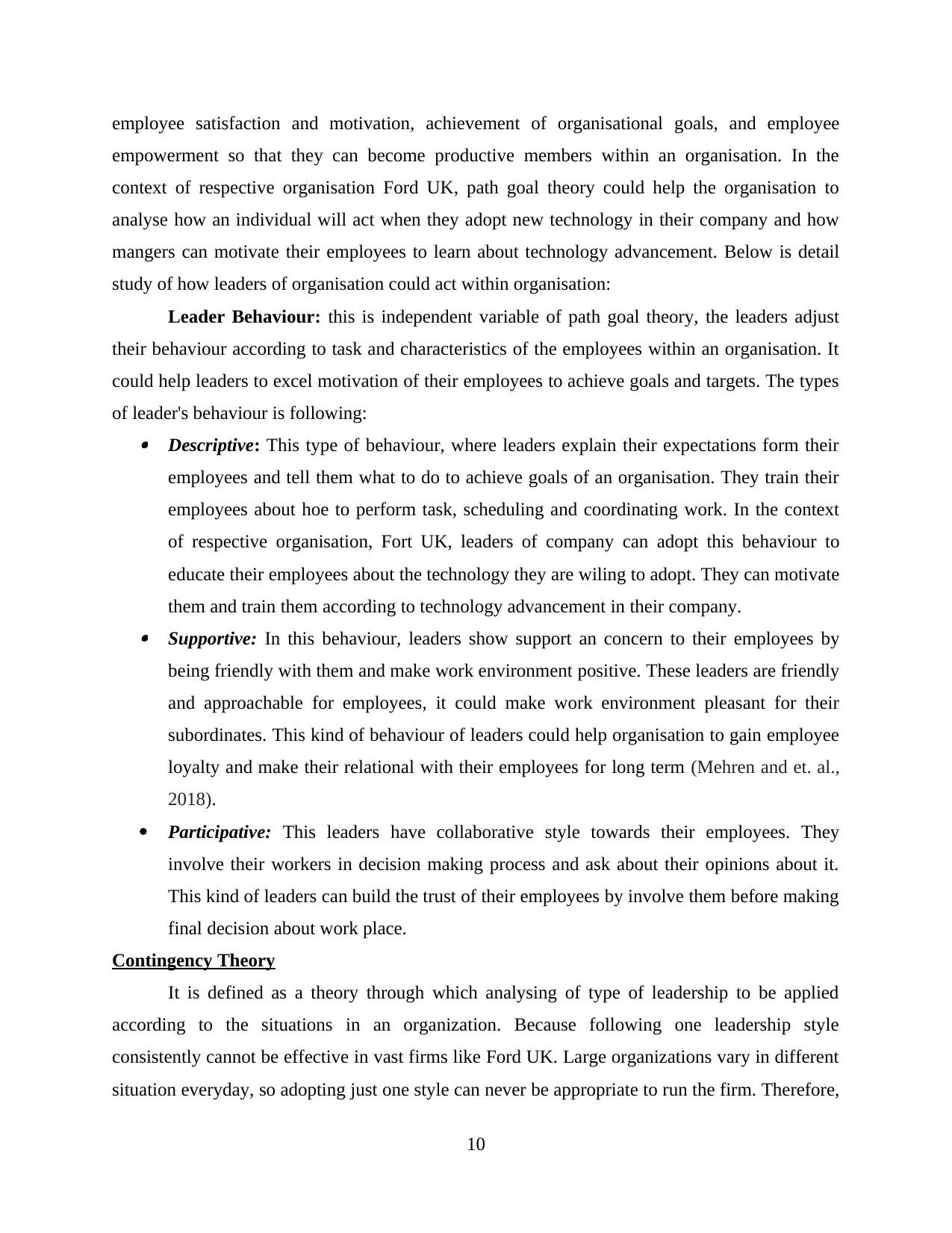
employee satisfaction and motivation, achievement of organisational goals, and employee
empowerment so that they can become productive members within an organisation. In the
context of respective organisation Ford UK, path goal theory could help the organisation to
analyse how an individual will act when they adopt new technology in their company and how
mangers can motivate their employees to learn about technology advancement. Below is detail
study of how leaders of organisation could act within organisation:
Leader Behaviour: this is independent variable of path goal theory, the leaders adjust
their behaviour according to task and characteristics of the employees within an organisation. It
could help leaders to excel motivation of their employees to achieve goals and targets. The types
of leader's behaviour is following: Descriptive: This type of behaviour, where leaders explain their expectations form their
employees and tell them what to do to achieve goals of an organisation. They train their
employees about hoe to perform task, scheduling and coordinating work. In the context
of respective organisation, Fort UK, leaders of company can adopt this behaviour to
educate their employees about the technology they are wiling to adopt. They can motivate
them and train them according to technology advancement in their company. Supportive: In this behaviour, leaders show support an concern to their employees by
being friendly with them and make work environment positive. These leaders are friendly
and approachable for employees, it could make work environment pleasant for their
subordinates. This kind of behaviour of leaders could help organisation to gain employee
loyalty and make their relational with their employees for long term (Mehren and et. al.,
2018).
Participative: This leaders have collaborative style towards their employees. They
involve their workers in decision making process and ask about their opinions about it.
This kind of leaders can build the trust of their employees by involve them before making
final decision about work place.
Contingency Theory
It is defined as a theory through which analysing of type of leadership to be applied
according to the situations in an organization. Because following one leadership style
consistently cannot be effective in vast firms like Ford UK. Large organizations vary in different
situation everyday, so adopting just one style can never be appropriate to run the firm. Therefore,
10
empowerment so that they can become productive members within an organisation. In the
context of respective organisation Ford UK, path goal theory could help the organisation to
analyse how an individual will act when they adopt new technology in their company and how
mangers can motivate their employees to learn about technology advancement. Below is detail
study of how leaders of organisation could act within organisation:
Leader Behaviour: this is independent variable of path goal theory, the leaders adjust
their behaviour according to task and characteristics of the employees within an organisation. It
could help leaders to excel motivation of their employees to achieve goals and targets. The types
of leader's behaviour is following: Descriptive: This type of behaviour, where leaders explain their expectations form their
employees and tell them what to do to achieve goals of an organisation. They train their
employees about hoe to perform task, scheduling and coordinating work. In the context
of respective organisation, Fort UK, leaders of company can adopt this behaviour to
educate their employees about the technology they are wiling to adopt. They can motivate
them and train them according to technology advancement in their company. Supportive: In this behaviour, leaders show support an concern to their employees by
being friendly with them and make work environment positive. These leaders are friendly
and approachable for employees, it could make work environment pleasant for their
subordinates. This kind of behaviour of leaders could help organisation to gain employee
loyalty and make their relational with their employees for long term (Mehren and et. al.,
2018).
Participative: This leaders have collaborative style towards their employees. They
involve their workers in decision making process and ask about their opinions about it.
This kind of leaders can build the trust of their employees by involve them before making
final decision about work place.
Contingency Theory
It is defined as a theory through which analysing of type of leadership to be applied
according to the situations in an organization. Because following one leadership style
consistently cannot be effective in vast firms like Ford UK. Large organizations vary in different
situation everyday, so adopting just one style can never be appropriate to run the firm. Therefore,
10
⊘ This is a preview!⊘
Do you want full access?
Subscribe today to unlock all pages.

Trusted by 1+ million students worldwide
1 out of 16
Related Documents
Your All-in-One AI-Powered Toolkit for Academic Success.
+13062052269
info@desklib.com
Available 24*7 on WhatsApp / Email
![[object Object]](/_next/static/media/star-bottom.7253800d.svg)
Unlock your academic potential
Copyright © 2020–2026 A2Z Services. All Rights Reserved. Developed and managed by ZUCOL.




